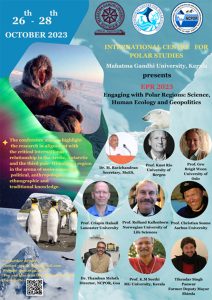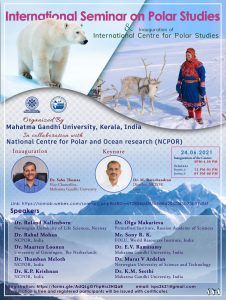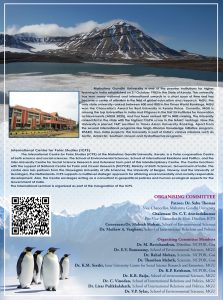
“Engaging with Polar Regions: Science, Human Ecology and Geopolitics (EPR 2023)”
October 26-28, 2023
Organised by
International Centre for Polar Studies (ICPS)
Mahatma Gandhi University, Kottayam, Kerala, India
In association with
National Centre for Polar and Ocean Research. Goa, India
About the host institute –
The International Centre for Polar Studies (ICPS), a new initiative at the Mahatma Gandhi University, Kerala, is a Polar Cooperation Centre of both science and social sciences. The Centre was formed as a result of continuous interaction with the National Centre for Polar Sciences, the Ministry of Earth Sciences, Government of India. ICPS supports a multilevel strategic approach for attaining environmentally and socially responsible development in the polar regions.
Introduction
The rapid changes in polar ecosystem have ecosystemic, socio- political and governance implications. According to the Intergovernmental Panel on Climate Change (IPCC), the melting glaciers, disappearing sea ice, and thawing permafrost in the Arctic have led to predominantly negative impacts, on food security, water resources, water quality, infrastructure, transportation, tourism, and recreation. The socio-cultural and human geographical implications, often with indigenous dimensions, are complex.
India’s stakes in the Poles have grown after proclaiming its Arctic policy & enunciating the Antarctica law in 2022, India’s Arctic Policy aims to enhance the country’s cooperation with the rapidly transforming Arctic region. The policy also seeks to combat climate change and protect the environment in the region, which is warming three times faster than the rest of the world.
ICPS is hosting a conference that stretches on scientific, social & diplomatic frames in the polar region. The conference aims to highlight the research in alignment with the critical international relationship in the Arctic, Antarctic and the third pole- Himalayan region in the arena of socio-economic, political, anthropologic, ethnographic and traditional knowledge.
The International conference will put emphasis on climate change and the politics of climate change, cryospheric science, geopolitics of the polar region as well as environmental governance. Anthropology of polar life and relationship will pay critical attention to human/non human ecologies. further we explore the interdisciplinary dimensions of polar technologies, blue economy as well as the contexts of pollution in the region.
EPR-2023 also aims to bring eminent researchers and scientists working in the diverse Polar region of the Arctic, Antarctic, Southern Ocean and the Himalayas to a common ground. This event will also provide a platform for Early Career Researchers to interact and exchange their research ideas, findings and experiences. The EPR 2023 aims to
Organizing Committee
CT Aravindakumar (Chairman)
Mahesh Mohan (Convener)
Mathew A Varghese (Co- Convener)
Baiju KR
EV Ramasamy
Lirar Pulikkalakath
KM Seethi
C Vinodan
Advisory Committee-
Thamban Meloth
Manish Tiwari
Rahul Mohan
A A Mohamed Hatha
Sunil PS
Knut Mikjel Rio
Murat V. Ardelan
Marten Loonen
Roland Kallenbornssssss
Guidelines for Abstract Submission
The abstract text is to be limited to a maximum of 350 words, typed in Arial font size 12 in MS Word, mentioning the Title, Name(s) of the Author(s), affiliation with the Organisation should be submitted through the conference website https://icps.mgu.ac.in/ . Abstracts must focus on scientific/operational results or their application. An author can submit only one abstract as a first author.
While submitting the abstract, the author must mention the sub-theme under which he/she is willing to present their work and the name of the corresponding author during online submission. Author should also indicate Oral or Poster while submitting an abstract for the conference. However, the final decision on Oral or Poster will be announced while accepting the abstract. Final decisions regarding the placement of individual abstracts and sessions rest with the Session Chairs and Scientific Organizing Committee. The corresponding author is responsible for ensuring that all co-authors have agreed to be listed on the abstract.
Registration
Registration will be done online
Registration Fees
For Foreign Delegates USD 200/-
For Research Students/Associates Rs.1000/-
For Scientist/ Others Rs.2000/-
Onsite Registration Rs.2500/-
Online payment/Cash will be accepted for Onsite Registration. Registration fee includes conference materials, lunch and other refreshments.
For online transfer of amount through NEFT the following details be noted:
Name of Account holder: Convener, EPR 2023
Account No: 42111792022
IFSC : SBIN0070669
Deadline and important dates
Online registration starts August 15, 2023
Last date for abstract submission September 30, 2023
Notification of Acceptance of Abstract October 10, 2023
Online registration Closes October 15, 2023
Accommodation and Travel
Shared hostel/shared hotel accommodation can be provided for Research Students/ Research fellows, on request. List of hotels at Kottayam (short distance from conference venue) on concessional prices will be available for booking directly on payment basis.
Target Group
The conference aims to develop consensus among the scientists and policymakers towards research and innovations. The physical interactions in 2023 will strive to encourage a higher degree of cooperation and collaboration in cross border scientific programmes among like-minded research groups/institutions for sustaining research in the area of polar science & geopolitics, climate change and sustainability under hostile environment and help resource sharing for the benefit of mankind in general.
Venue and Date
The conference is being hosted by the International Centre for Polar Studies at Mahatma Gandhi University premises during October 26-28, 2023.
Scientific, Human Ecological & Geopolitical session –
Researchers are invited to participate and present their findings on various aspects of Polar Regions including Himalayas. The conference may be invited and selected ,oral and poster presentations. High quality original and unpublished work (conceptual, constructive, empirical, experimental, or theoretical) shall be encouraged.
Collaborating Institutes
Topics:
International Seminar on Polar studies (ISPS)
A one day International Seminar on Polar studies was organised in connection with the inauguration of the International Centre for Polar Studies (ICPS) by Mahatma Gandhi University in collaboration with National Centre for Polar and ocean research (NCPOR), Goa on 24 June 2021. This seminar was a premier event for scholars and students and offered unique educational and operational knowledge sharing within the broad spectrum of Polar science. The Seminar aimed to throw up newer ideas that could go a long way in streamlining polar studies globally. The seminar was inaugurated by Prof. Sabu Thomas, Vice chancellor, Mahatma Gandhi University and the keynote address was given by Dr. M. Ravichandran, Director, NCPOR. Diverse resource persons from various fields of Polar science across the world participated in the seminar. They shared their expertise on both social and scientific aspects of the polar environment.
Dr. Rahul Mohan, (Scientist, NCPOR), explained the history of Antarctic expeditions, the present status and the impact of human activities on the Antarctic. Dr. K.P.Krishnan (Scientist, NCPOR) detailed the challenges and opportunities in Arctic research. Dr. Seethi (Director, IUCSSRE, Mahatma Gandhi University) presented new insights into the geopolitical aspects of the Arctic. Dr. Thamban Meloth (Scientist, NCPOR) highighted the significance of the Third pole, Himalaya on the changing climatic conditions. Mr. sony from World Resource Institute presented the ecological issues of Himalaya based on their studies in Western Himalaya.
A detailed account of the contamination in the Antarctic waters, Arctic regions and influence of regional changes on global process was presented by Dr. Kallenborn (Norwegian University of Life Sciences) and Dr. Ramasamy (School of Environmental Sciences, MG University). Dr. Loonen (University of Groningen) briefed the Arctic research facilities at Svalbard. There were discussions on ecosystems and climate change and the impact on humans and their role in managing the ecosystems by Prof. Murathand and Dr.Mathew ( Norwegian University of Science and Technology).
ISPS served as a platform for addressing the socio-political-environmental challenges in polar studies. It provided an opportunity to gain valuable insights to assist and to explore the opportunities in the socio-political and scientific dimensions of the Polar environment. More than 500 participants have attended the seminar from various parts of the globe.
Conveners : Dr. Mahesh Mohan & Dr. Mathew A. Varghese
Joint Directors, International Centre for Polar Studies

